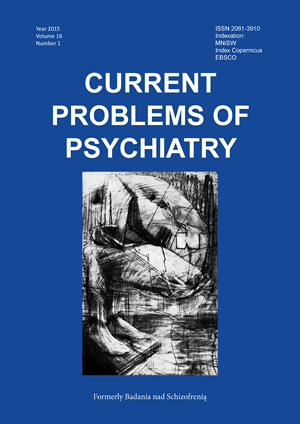The age of alkohol initiation among patients treated for addiction
Keywords:
alcohol dependence syndrome, alcohol induced neurodegeneration, age groupsAbstract
Introduction: According to WHO, alcohol is considered to be one of the three main risk factors for the health of the population. Each year about 3,3 million of people on the World die due to excessive alcohol consumption, and alcohol dependence is classified as a disease. Alcohol abuse has a negative impact on all systems of the body, however, the greatest influence is noted in relation to the central nervous system, where the irreversible neurodegenerative changes take place.
The aim of the study: The aim of the study is to analyze the age of alcohol initiation among patients treated for addiction taking into account variables such as age, sex, place of residence and level of education.
Material and methods: The material for the analysis are data collected from 121 patients from Lublin province of various ages with different levels of education, first-time or again hospitalized at the detoxification ward in the Neuropsychiatric Hospital in Lublin.
Results: The average age of an alcohol initiation in the examined group of patients treated for addiction was 16,5 years of age. The earliest recorded age of an alcohol initiation in this group was 11, while the latest one 25 years of age. As many as 75% of patients experienced their first contact with alcohol before the age of 18 years.
The analysis of data revealed a statistically significant difference between the age of the alcohol initiation and the level of education obtained in later life.
References
1. WHO Expert Committee on Problems Related to Alcohol Consumption. Second Report. WHO Technical Report Series 944.
2. B.T. Woronowicz. Bez Tajemnic. O Uzależnieniach i ich leczeniu. Instytut Psychiatri i Neurologii. Warszawa 2001, wyd.1.
3. International Satistical Classification of Diseases and Related Health Problems, WHO 2010.
4. Pitkänen T, Lyyra AL, Pulkkinen L. Age of onset of drinking and the use of alcohol in adulthood: a follow-up study from age 8-42 for females and males. Addiction, 100, 652-661.
5. Dawson D. A. The link between family history and early onset alcoholism: earlier initiation of drinking or more rapid development of dependence? Journal of Studies on Alcohol and Drugs 2000; 61: 637-646.
6. Guerri C, Pascual M.Mechanisms involved in the neurotoxic, cognitive, and neurobehavioral effects of alcohol consumption during adolescence. Alcohol. 2010 Feb; 44(1): 15-26.
7. Donovan JE. The Burden of Alcohol Use: Focus on Children and Preadolescents. Alcohol Research : Current Reviews 2014; 35(2): 186-192.
8. Hibell B, Guttormsson U, Ahlstrom S, Balakireva O, Bjarnason T, Kokkevi A, and Kraus L. The 2007 European School Survery Project on Alcohol and other Drugs (ESPAD) Report: Substance Use among Students in 35 European Countries. 2007. The European Monitoring Center for Drugs and Drug Addiction (EMCDDA). pp. 1-408.
9. CBOS, Wzory konsumpcji alkoholu w Polsce, 2008.
10. Pitkänen T, Lyyra AL, Pulkkinen L. Age of onset of drinking and the use of alcohol in adulthood: a follow-up study from age 8–42 for females and males. Addiction, 2005; 100(5): 652-661
11. Sartor CE, Lynskey MT, Heath AC, Jacob T, True W. The role of childhood risk factors in initiation of alcohol use and progression to alcohol dependence. Addiction. 2007 Feb;102(2): 216-25.
12. Rothman EF,Edwards EM,Heeren T,Hingson RW, Adverse Childhood Experiences Predict Earlier Age of Drinking Onset: Results From a Representative US Sample of Current or Former Drinkers. Pediatrics 2008; 122(2); s. 298-e304;
13. Donovan JE, Leech SL, Zucker RA, Loveland-Cherry CJ, Jester JM, Fitzgerald HE et al. Really underage drinkers: alcohol use among elementary students. Alcohol Clin Exp Res. 2004 Feb;28(2): 341-9.
14. Zeigler D, Wang C, Yoast R, Dickinson B, McCaffree M, Robinowitz C i in. The neurocognitive effects of alcohol on adolescents and college students, Preventive Medicine 40(1), s. 23-32.


